One of the most influential and popular theories of development was put forward by Erikson. He was an ego psychologist from the 20th century and is famous for his contributions in the fields of psychoanalysis and developmental psychology. He developed a theory to explain how individuals tend to mature in life.
Erikson’s Theory
Erikson’s theory was influenced by the works of another great psychologist known as Sigmund Freud. He based his work on Freud’s psychosexual theory and modified it. This gave rise to the eight stages of his Psychosocial theory that we now know today. He believed that our ego plays an important factor in our development. He believed that our ego contributed to our development in a positive way by mastering skills, ideas, and attitudes at each stage of our development in life. This mastery and retention of skills help children develop into mature and successful members who contribute to our society. He had a particular interest in how relationships and social interaction play an important role in the growth and development of us humans.
He believed that there was a presence of conflict during each stage. If an individual managed to successfully deal with it, he/she would develop psychological skills/strengths which would serve them well for the rest of their lives. If they failed to do so, they would not develop essential life skills. Erikson also believed that at each stage, a person would need to master those qualities which he often referred to as “ego-strength” or “ego-quality.” Thus, if an individual managed to master abilities at each stage, they would feel a “sense of accomplishment” and if they failed, they would emerge with a “sense of inadequacy.”
The 8 Stages Of Life According To Erikson
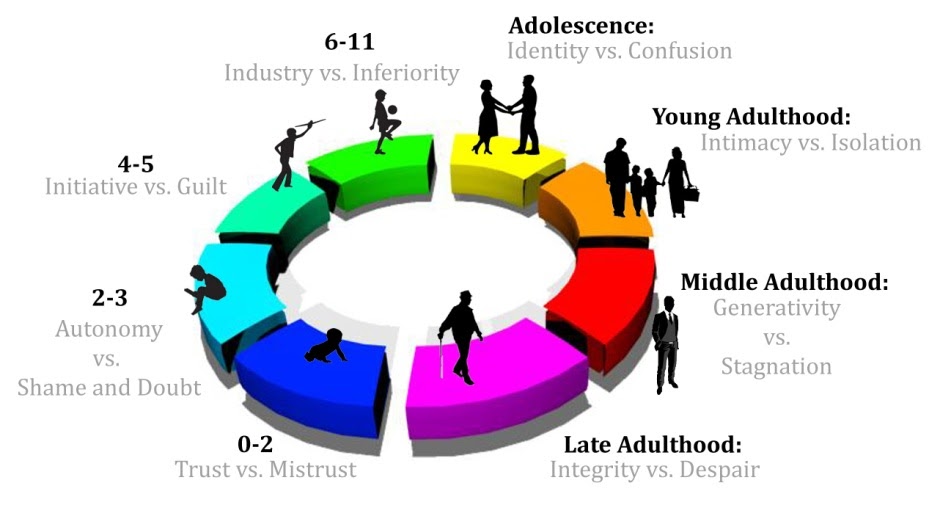
Erikson developed his theory based on Sigmund Freud’s psychosexual theory. He developed his own eight stages of a person’s development from infancy to mature adulthood. The stages are built on the effect social interaction has on people and the way they mature. His theory is considered to be an important part of the psychology of development. It elaborates on the various challenges a person faces during his/her development. Each stage has conflicts that the person needs to overcome. Also, an individual does not necessarily need to complete one stage to progress to the next. They will automatically progress to the next stage. However, if they do not overcome the conflicts, then the challenges will continue to affect their lives throughout all the stages until they finally resolve them.
1. Stage 1: Infancy (Birth – 12 to 18 months)
Factors: Trust vs Mistrust
The first stage of his theory begins when a person is born and continues till that person is 12 to 18 months old. This is one of the most fundamental stages in one’s life. In this stage, infants learn to trust adults. This happens when an adult fulfills an infant’s requirements for survival, like providing for food, care and shelter.
Trust: When a caregiver or an adult promptly responds to the infant’s cries, the infant can start trusting people around them. They can develop a sense of security and trust. This affects them in later stages when they learn to trust people.
Mistrust: When the adult tends to neglect the infant’s needs for survival or provides sporadic care, the infant will start growing insecure. They might start learning not to trust people or adults around them. They can carry this trait forward when as teenagers or adults, they tend to doubt people.
2. Stage 2: Toddlerhood (18 months – 3 years)
Factors: Autonomy vs Doubt
During this stage, infants grow up into young children. They start exploring their surroundings and learn more about the world they are in. They also start to develop basic life skills in this stage such as toilet training and speaking with clarity.
Autonomy: If in this stage, the caregiver or the parent makes them feel safe about their surroundings and allows them to explore, children will develop skills in risk-taking. They will feel confident about exploring new ideas, skills, locations, etc.
Doubt: If the caregiver fails to make the child feel protected and safe and also discourages them from taking risks, the child will grow up to be insecure. They will start doubting their abilities and will depend too much on the parent.
3. Stage 3: Preschool (3 – 6 years)
Factors: Initiative vs Guilt
This stage allows young children to become independent and set goals for themselves. Erikson believes that at this stage children should learn to set their own goals and achieve them, while at the same time interacting with different people and also children their age.
Initiative: When parents and caregivers support children in being independent, learning to set goals, and accomplishing them, they grow into adults who are able to make decisions and abide by them in a mature way.
Guilt: When these same children get criticized for taking independent decisions and being assertive of situations, they might feel guilty for their actions or their desires. When a parent becomes controlling of their child’s decisions, the child may learn to follow someone else’s decisions or ideas, rather than being confident in their own.
4. Stage 4: Early years in school (5-12 years)
Factors: Industry vs Inferiority
In this stage, children have an increased sense of perception and consciousness. They start comparing themselves to other people. They engage in social interactions and try to establish their own individuality.
Industry: Children who are more accomplished than others can begin to take a sense of pride for their achievements. They become self-confident and when parents praise them, it can boost their self-esteem also.
Inferiority: Children who have not yet achieved anything significant here can start doubting their self-worth. When they are criticized by their parents for this, they can start feeling inferior to others.
5. Stage 5 : Adolescence (12-18 years)
Factors: Identity vs Confusion
This is the point where children start to question their existence. They may try to find answers to the question “Who am I?”, and try developing different personalities to see which suits them the best.
Identity: in order to be successful in this stage, students need to be aware of their abilities and develop a sense of self-awareness. They will try to determine what their priorities in life are, like academics, family, hobbies, etc., and try to set goals for themselves, in order to accomplish those priorities.
Confusion: Some children may have not yet developed their sense of self-awareness. They might struggle with becoming the person their parents or their society expects them to be. They may start to get confused about who they are and what they want to do in life without a consistent self-identity.
6. Stage 6: Young Adulthood (18-40 years)
Factors : Intimacy vs isolation
Erikson was of the opinion that at this stage, young adults tend to dwell into relationships and get married. They are ready to share their lives with other people and explore a lot of relationships to find the one which suits them the most.
Intimacy: If young adults are able to find a meaningful relationship, they will be able to sense intimacy and affection. They benefit from an emotional perspective by having a lifelong commitment or bond.
Isolation: If these people are not able to find suitable relationships, they might start experiencing loneliness. They may withdraw from social activities and lead a life of isolation.
7. Stage 7: Middle Adulthood (40-65 years)
Factors: Generativity vs Stagnation
The main purpose of this stage is to be self-independent and established in life. People at this age contribute to society, have well-built careers, and also raise children.
Generativity: Here people try to guide and mentor their children and other young adults. They can leave behind legacies for others to follow. They may also contribute to society in a significant way.
Stagnation: Some people in this stage might feel that they have no contribution towards society. If their coworkers or counterparts do not appreciate their work or efforts, they might find themselves getting frustrated and restless. Some people might feel that they have reached a ‘peak’ in their lives and things are only going to get worse from there.
Read The 3 Stages in the Midlife Search for Meaning
8. Stage 8 : Late Adulthood (65 years and above)
Factors: Integrity vs Despair
During this stage, which is the final according to Erikson, people tend to reflect on their lives a lot. People here grow old and the pace of their life slows down. They look back on their past and try to assess their achievements. People who take pride in their past achievements tend to feel a sense of satisfaction and accomplishment here.
Integrity: People who feel that their lives have been fulfilling, wholesome and rewarding can face their old age and even death with integrity or pride. They feel like they have accomplished something in life and all those years were worth living for.
Despair: However, people who have been unsuccessful in their previous stages may experience feelings of despair or loss. If they feel that their lives have been unproductive, they might get depressed.
Limitations Of Erikson’s Theory
Although his theory received much recognition and popularity, it also received its fair share of criticism from other people from the psychological community. These limitations are :
1. Critics tend to say that Erikson gave a lot of stress on early childhood development and neglected any kind of development which can also occur in adulthood. He himself had admitted at some point in his life that a person’s personality could change when they grow into adults. However, he did not offer any explanation for the same.
2. Erikson had also been criticized for his stress on male personality and development, leaving out the female counterparts. He had agreed that personalities are subject to change based on genders, however, he did not do anything to rectify his previous theories.
3. Some critics say that Erikson’s theory was based on more speculations rather than having accurate data for the same. He based his theories on psychological case studies available at the time. Modern psychologists are of the opinion that many of Erikson’s theories do not apply to everyone and are not a rule of thumb.
Erikson’s Theory Of Psychosexual Development – A Summary
Erikson’s theory provides us with a unique perspective on the development of individuals. His theory can be useful in understanding the challenges and conflicts people face while growing up and how they can affect them in later parts of their life. However there are other personality theories that exist and thus, his theory should be taken at face value.
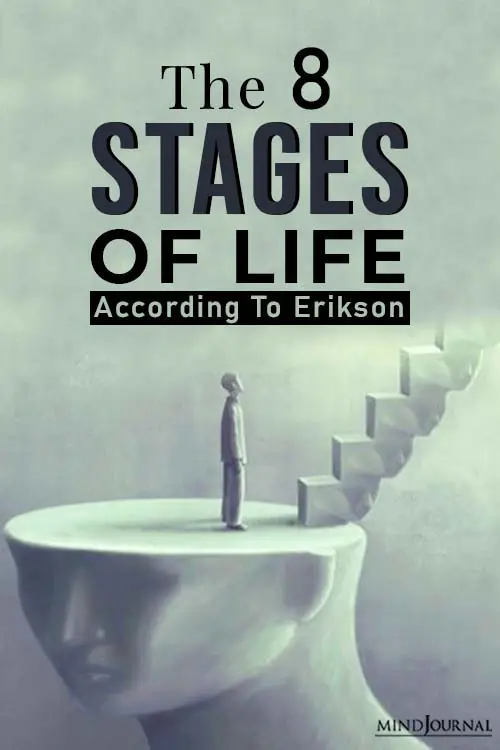
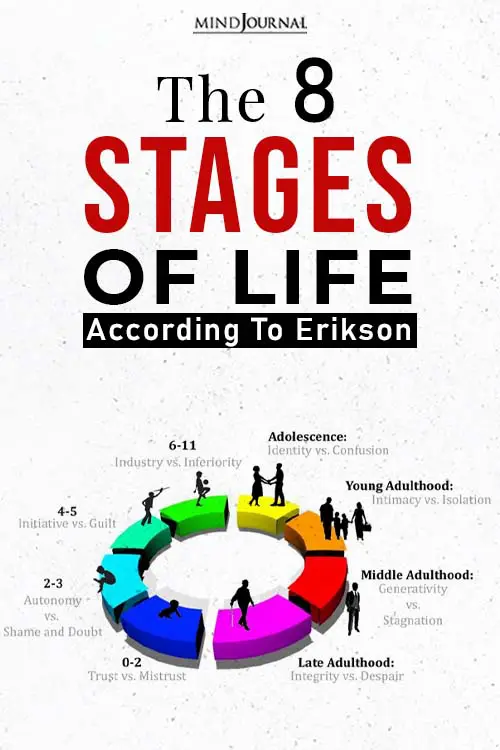

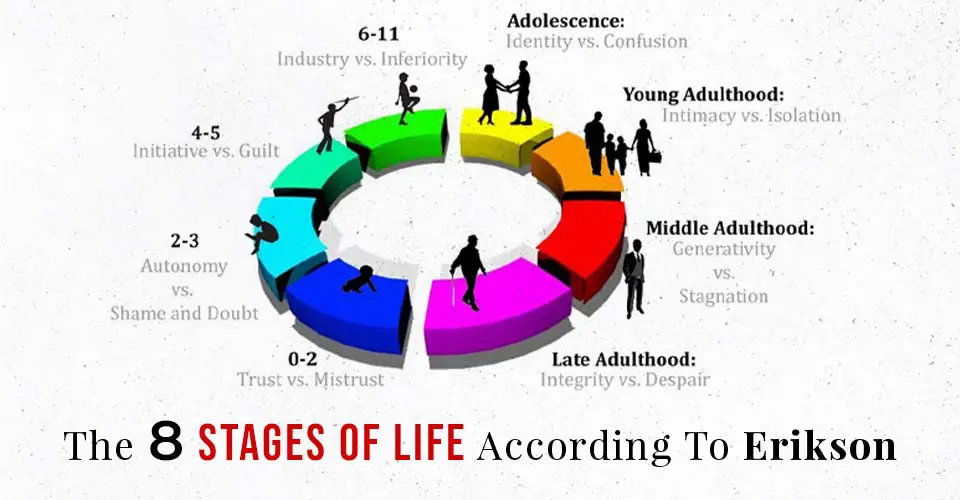





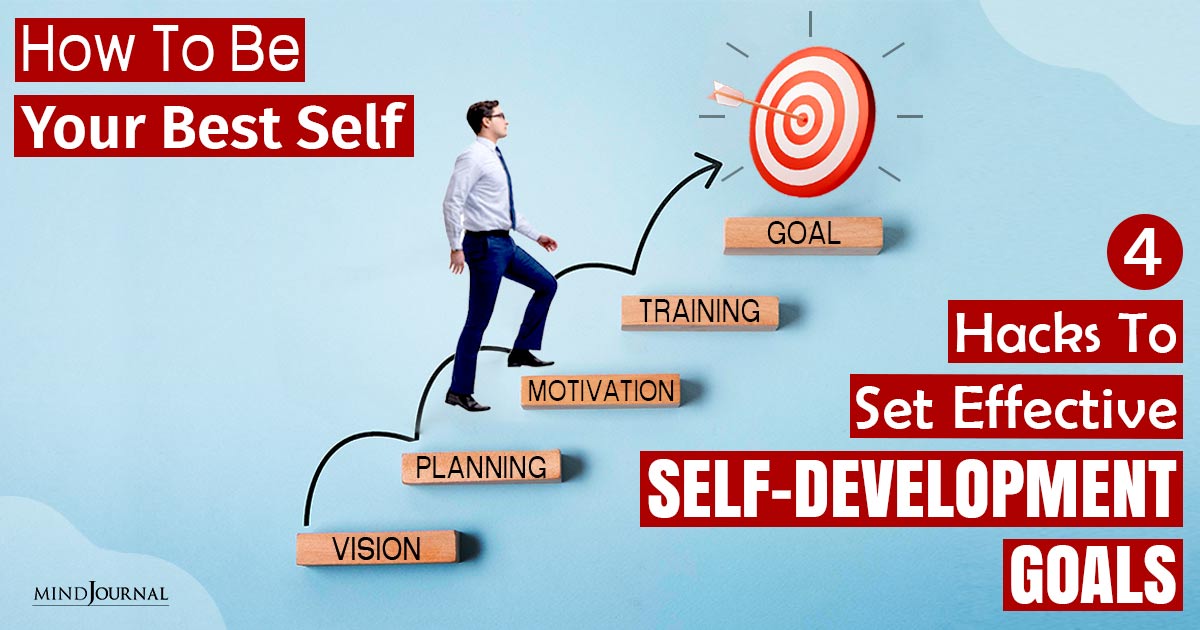

Leave a Reply
You must be logged in to post a comment.